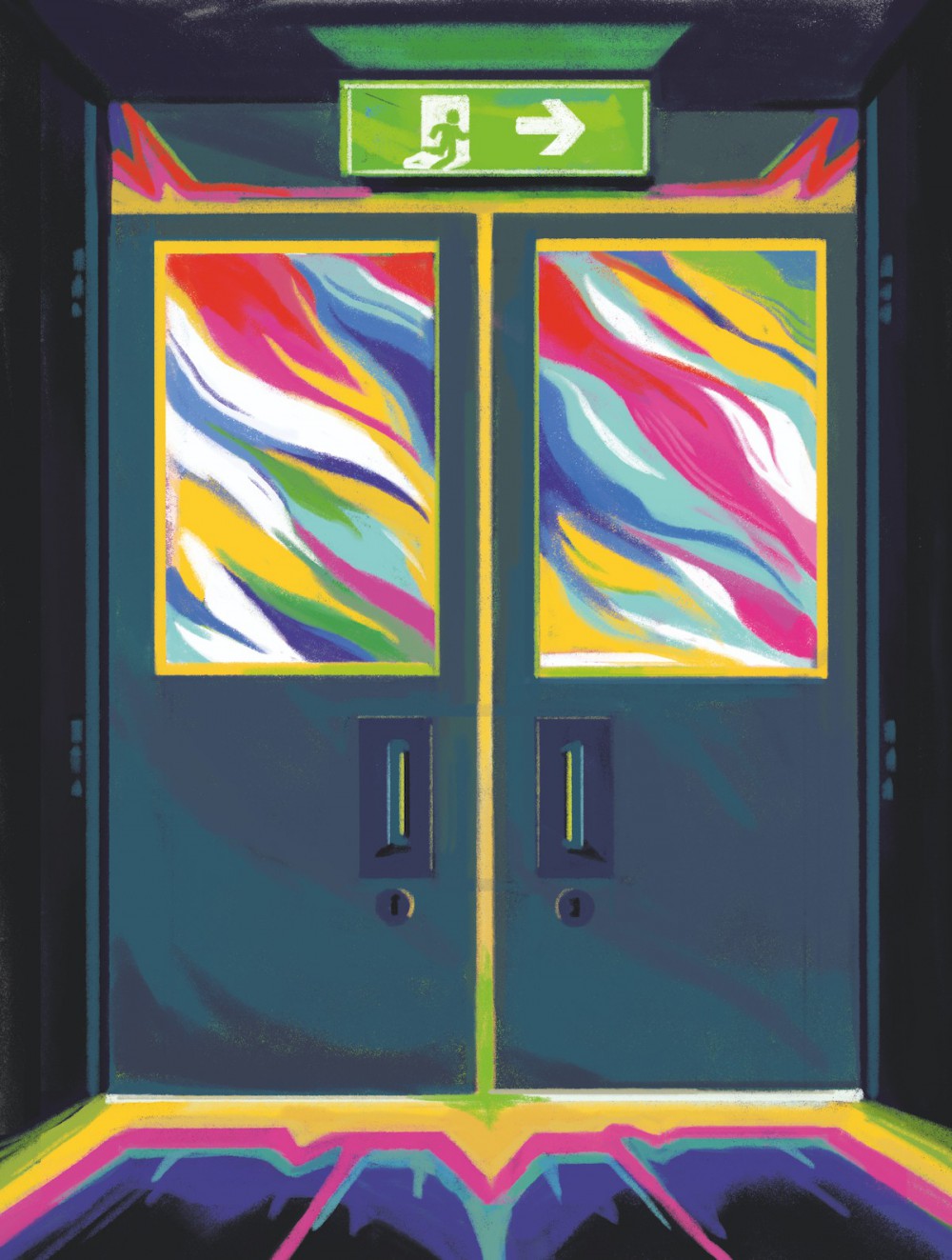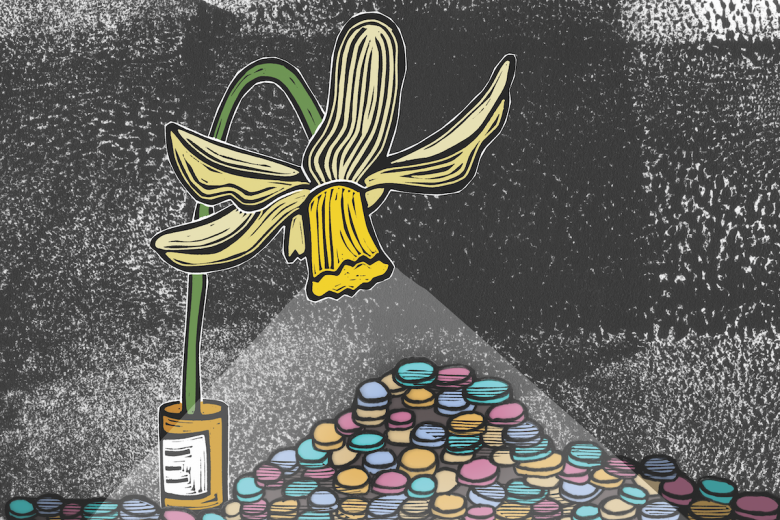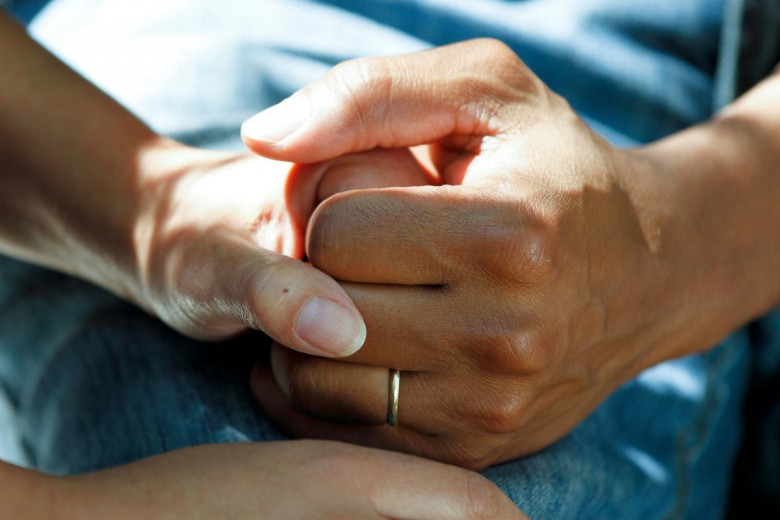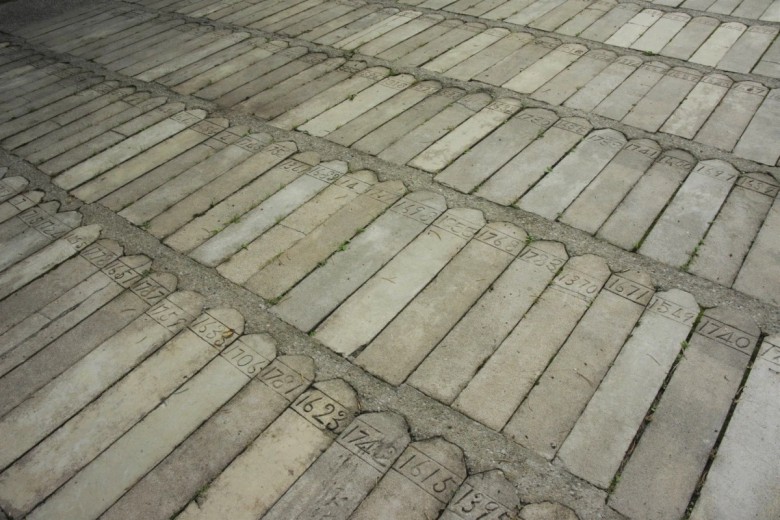
Rachel Joan Wallis
“Gilgamesh, who saw the Deep, the country’s foundation...”
—The Epic of Gilgamesh
Picture a hospital ward: linoleum tiles, beige walls, wide hallways, steel kickplates, fluorescent lights, tinted windows, and a nursing station located at the centre of the floor.
Take away the medical accoutrements: hospital beds, oxygen outlets, station monitors, and all those tubes, cords, cables, and little things that click and hiss. Take away the dual elevator shaft and replace it with a Big Locked Door, warning sign attached. Add shatterproof glass everywhere. Make the chairs in the dayroom too heavy to throw. Add patient art, puzzles, board games, a small, dilapidated library, a handful of empty DVD boxes, and perhaps a single, weary personal computer.
On a table near a sealed window in the common kitchen, place a few small containers of milk, yogourt, a piece of wheat bread, a bran muffin, saltine crackers, one institutionally tepid cup of decaffeinated coffee with a plastic lid and – in a rolling rack – a single remaining dinner tray, labelled with the name of someone you will never meet.
Take away the underlying odor of antiseptic and replace it with despair.
“Are you having thoughts of harming yourself or someone else?”
At night I am lonely, as a small child is afraid of the dark.
I have laid waste to all around me.
We gaggle near the nursing station, but Eric, the new guy – who has a series of black dots tattooed down his jugular vein – doesn’t want his meds. He looms over the nurse, jaw working, fists clenching, leg vibrating. He hasn’t been here long enough to realize that although meals are optional, getting dressed is optional, emerging from one’s room is optional, and even showers are optional, meds are never, ever optional.
The psychiatric nurse stands her ground. “Doctor Navarro will see you tomorrow morning but you’re taking these now. Are you having thoughts of harming yourself or someone else?” Eric reconsiders, shakes his head, switches off his anger and calmly asks, “Can I get a Lorazepam?”
The nurse hesitates, checks Eric’s chart, and gives a short nod; her assistant adds the sublingual pill to a second little paper cup. A larger cup of water, mood stabilizers down the throat, and Eric knows where the benzo goes.
Crisis averted.
Everyone wins; the nurse solves Eric, he gets down, and we get our meds. The woman behind me snickers and murmurs: “He’s catchin’ on fast.” From behind her: “Scooby Snacks!” and “Frequent Flyer!”
And that’s it, I just can’t help laughing while the nurse glares at me, thinking I’m laughing at her. I am, but it’s her as the face of a dysfunctional system. I hold my personal grudges close. Earlier, she replaced my nicotine patch in a typically distracted manner – out of vertical alignment and on the wrong place on my arm, or at least not in the pre-shaved spot I intended to place it myself. That’s a big thing here, because in MAUI – the Mood & Anxiety Inpatient Unit – with no electronics allowed, we’re as bored as Pablo Escobar in hiding. Re-upping on the only drug I have left is a big event.
“Are you having thoughts of harming yourself or someone else?”
Familiar to my enemies, I am as a stranger to myself.
I sleepwalk through my days, dreaming of death.
I can’t sense your big events; you haven’t said much since you arrived alone this morning in battered Converse All Stars, pyjama pants, and a hoodie, with no possessions. One hates to pry. You still have that half-lost look of the psychiatric patient’s inevitable first questions:
“How did this happen? What brought me here? How do I get out?”
It all piled up, or came crashing down, or broke. It just wasn’t manageable anymore and you hurt yourself, or planned to hurt yourself, or scared someone. You gave up for a bit or needed to be away from the insanity of the world, or just shut off. Perhaps the sleepless nights went on too long and the background susurration became a whisper, then finally an importuning voice.
Then, perhaps, you got a glimpse into The Deep that lies beneath this world.
You committed yourself or were committed by a family member or a doctor for observation and then – either gently or not so gently – encouraged to stick around for 72 hours, two weeks, or an indeterminate period.
I can see the shame in your eyes, but it doesn’t matter why you’re here. You simply are.
If you’re like me, your path out of this prison will follow the path of grief: denial, anger, negotiation, depression. But only acceptance and behavioural modification open the Big Locked Door. The staff say you are here to get better, but you are here to mourn your illusion of sanity.
For when it comes to mood and anxiety, who among us is truly healthy?
“Are you having thoughts of harming yourself or someone else?”
I have outlived my dreams, and my sleep is as life itself.
I have laid waste to all around me.
In the afternoons, sometimes, the recreational coordinators come, and we go outside for an hour. My cigarettes remain locked behind the nursing station; I can’t smoke on the grounds. One day, you join us for the first time at the elevator as we wait for a staffer to count us off and turn the magic key.
Outside, we straggle across the lawn to the special needs school. Some of us shoot hoops, some throw Frisbees, but my roommate Kit and I are shoulders deep in the gym’s storage cupboard, rooting around for whiffle balls.
Arms brimming with rainbows of perforated plastic, we return in triumph to the front lawn to set up bocce ball. There are physical barriers, language barriers, behavioural barriers, and cognitive barriers, but somehow we all agree on basic rules and a dogged competition ensues.
There is a delicious randomness to the game: the hang of the whiffles, the ludicrous bounces of the flimsy balls. And I see you smile for the first time, then shriek with laughter as a frail older man with no command of the English language winks at me, then proceeds to blow my best ball off the lawn with a perfectly placed final toss.
I laugh along but notice you are laughing and crying at the same time, then just crying as we return, staying separate enough from our group to avoid interaction.
“Are you having thoughts of harming yourself or someone else?”
I have outlived my dreams, and nightmares fill my waking life.
I sleepwalk through my days, dreaming of death.
After dinner you start talking to your roommate. Obliquely, in the code we use, and out it comes. The trauma, the drugs, the homelessness, the rapes, the encampment on Crown land, the clearance, and finally the committal. Through all this runs the fear, the hopelessness, the wait-list for housing; we never have anywhere to live.
At the next table over, I listen quietly with a greasy feeling of voyeurism, and I want to turn to you and tell you that you’re not alone but even I know how inappropriate a behaviour that would be.
My roommate Kit joins me, and we listen together.
Fingers tightly clasped as you look at the table, you hide one hand of ragged nails. “The nights on Crown land, there were –”
“Bears?” asks your roommate.
“No, more like –”
“Skinnies,” Kit states.
You flinch, Kit nods, and I am dismayed.
“What the fuck are Skinnies doing outside the city?” asks your roommate. Lips purse, heads lower, and we regard each other with glances to the side.
“You ever hear of The Deep?” Kit asks.
You snort, derisively.
“How many?” he asks.
You look out the window, recalling: “Only one at a time, but different ones each time.”
“Yeah –” I interject, “you never see more than one Cryptid. Until you don’t.”
You nod, knowing more than you are telling.
I try it from a different angle: “What happened to the Little People?” Again, your eyes shift.
“I don’t know, they just … went away.”
As though apropos of nothing, Kit offers: “I like the Little People.”
From behind me I hear Terry the schizophrenic, who writes in his journal with randomly capitalized words for emphasis, linoleum-screech his chair as he stands and blurts out: “Fucking crazies! God’s about to shut the sun off and you’re talking about that shit?”
Our psych ward think tank glances at him tolerantly, then gazes back into space, considering the implications of your story. There are many predators on the streets, but none so fearsome as these … hungry ghosts that prey upon the addicted and the insane.
I try dark humour: “Bad year for camping.” Everyone simply turns and looks at me.
“Are you having thoughts of harming yourself or someone else?”
I hide my heart from myself, and am a stranger to my Gods.
I have laid waste to all around me.
The visitors – the human ones – almost invariably family, arrive in ones and twos. Their bags and care packages are opened and inspected at the nursing station for anything we could use to harm ourselves. Sometimes an interview room is open for families to meet privately. Sometimes they cram into a shared bedroom. Sometimes they sit in the dining room.
Your parents arrive one morning and eventually find you there.
Sitting, they lean into each other, embarrassed and uncomfortable, and your father asks: “Are you OK?”
“Yes, I’m fine.”
“Are you still seeing things?”
You consider this like an appellate judge and eventually respond: “No?” They are not reassured.
Your mother hunts for words: “Do you need anything?”
“Not really.”
Three strangers in a featureless room; the movement of bare tree branches outside a blank, tinted safety glass window.
She tries again. “Not your slippers?”
“No.”
“But you’re just wearing a hospital gown and pants.”
“I’ll get dressed later –” and your gaze drifts back to the window.
“We brought your clothes.”
“– after you leave.”
I see your father physically supporting your mother as they wait at the Big Locked Door, and I try to smile at her as I say: “We get better.” I mean to provide comfort, but she looks at me like I’m an alien.
In time, my brother and sister come to visit and meet with my psychiatrist. As he gingerly explains to my family how ill I am, I lose my shit, start yelling, crying, then flee the interview room. Finished with the psychiatrist, they come to my room, where I am lying in bed fully clothed, covers pulled over my head.
My brother leans against the doorway: “All we want is to see you better.” Wishing to put down the bag he carries, he inspects the floor with a moue of distaste and evaluates an empty chair. “Is that chair clean?” asks my sister and I burrow further under the sheet. They are shadows seen through fog. Pain is selfish; I’m making this hard for them.
“I’m so sorry I can’t keep up the act anymore please don’t tell Dad how rough I am right now it’s my brain it’s all thinned out and fucked up from the street drugs and I don’t think it’s ever coming back I’m never coming back I’ve got no emotional regulation I’m not gonna make it –”
These words are easier to say when I’m hiding but I partly uncover my head after, and stare at a greasy fingerprint on the wall beside my bed. Is that peanut butter?
“Are you still seeing things?” I recognize the stoic look on my brother’s face. I know they love me, and I feel humiliation as I mutter, almost to myself: “Only at night.”
“No worries, we brought you some clothes and books.”
“Thanks, man, I’ll put them in my locker –”
A tilted head, a considering look: “You coming out from under there anytime soon?”
I retreat beneath the covers: “– after you leave.”
Kit, Eric, and Terry’s names have been changed to protect their privacy.
This essay was the winner of the creative non-fiction category of our 11th annual Writing in the Margins contest, judged by Amber Dawn. We gratefully acknowledge the financial support of the Regina Public Interest Research Group (RPIRG) for this year’s contest.




_780_520_90_s_c1.jpg)

